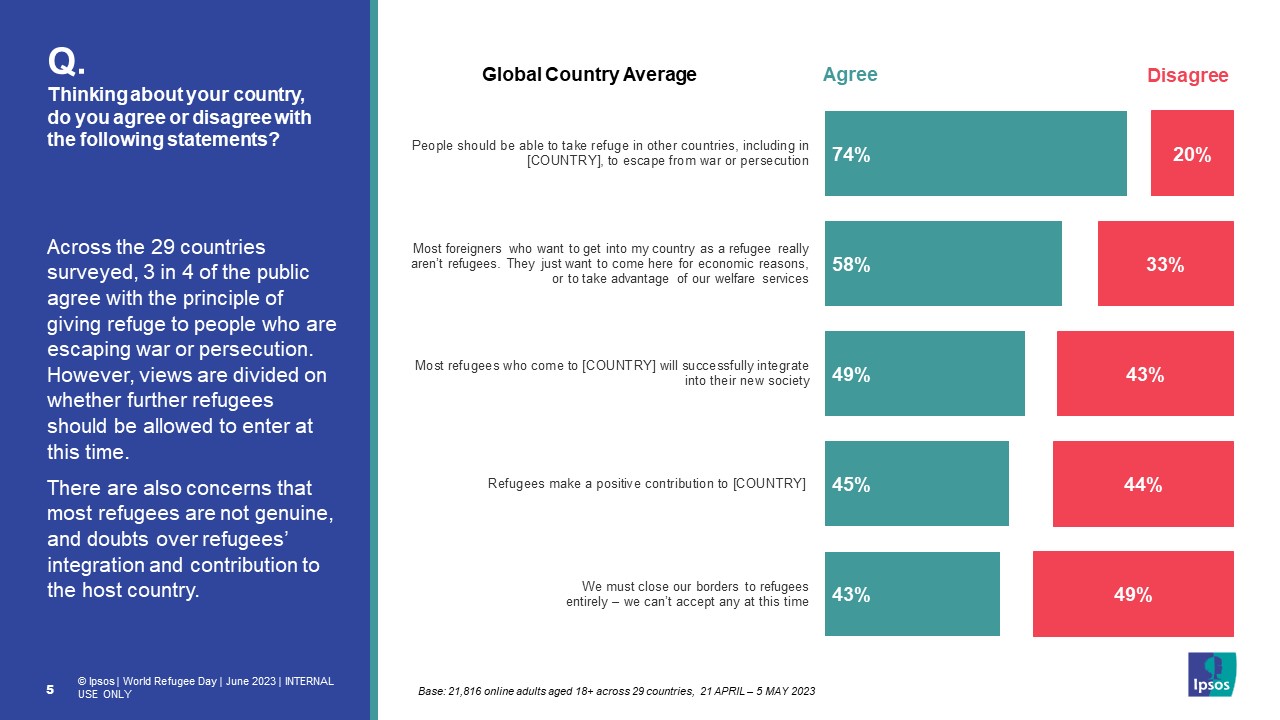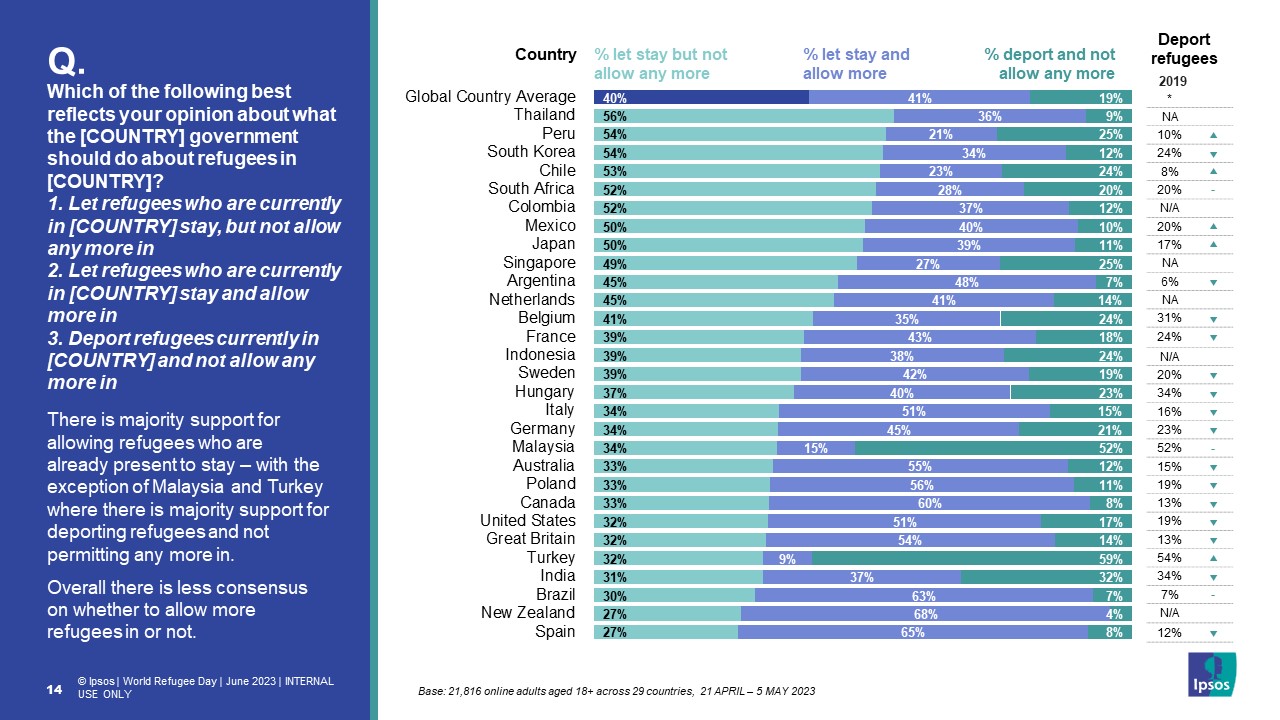World Refugee Day 2023: Despite a decline in support for refugees since 2022, support for the principle of refuge remains high
A NEW global study carried out in 29 countries by Ipsos for World Refugee Day shows that:
- Three in four adults on average across the countries surveyed support the principle of giving refuge to people escaping war or persecution. Moreover, a third reported that they have taken personal action in support of refugees in the past 12 months.
- Though public support for giving people refuge remains high globally, views are less positive than in 2022 in a number of countries, suggesting that some of the halo effects towards refugees in response to the war in Ukraine may have waned. The exception is in Great Britain where support has risen since 2022 and is higher than the global average.
- The public is supportive of allowing refugees currently in their country to stay – over eight in ten support this. However, they are divided on whether to accept further refugees. Again, views are more positive in Great Britain compared to the global average. Britain is also bucking the global trend in displaying higher levels of support for providing more legal routes so that refugees do not need to enter the UK illegally.
- As in previous years, the public’s main concern is whether people claiming to be refugees are in fact genuine. There is also some doubt over whether most refugees will successfully integrate into their host country. This means that whilst three in five of the public believe that allowing asylum seekers to work would help integration, half thinks it could attract people without a genuine asylum claim.
- The result of these tensions is further division in views on policies towards asylum seekers. However, on balance, more people support than oppose policies to restrict asylum seekers’ movement until their claim is successful and, to a lesser extent, to send applicants for asylum to a third country.
The survey, released today by Ipsos ahead of World Refugee Day on 20 June, reveals a global country average of 74% of people, in the 29 countries surveyed, agreed in principle that people should be able to take refuge in other countries, including their own, to escape war or persecution. One in five (20%) disagreed with this principle. Attitudes to refugees became more favourable in 2022 in most of the countries surveyed, suggesting that the Ukraine crisis increased public openness to refugees and reversed some of the concerns generated by the pandemic. In 2023 some of the positive shifts have been reversed. Nevertheless, attitudes have, in the main, remained in line with or more positive than before the Covid-19 pandemic.

The survey, which was conducted online between 21 April and 5 May 2023 with 21,816 adults, shows that a majority in all countries surveyed agreed with the principle of giving refuge, with the highest support in New Zealand (87%), Spain (85%) and Great Britain, Sweden and Canada (all 84%) and the lowest in South Korea (55%), Singapore (55%) and Turkey (61%).
Moreover, a third of people (33%) have also taken personal action in support of refugees in the past 12 months including donating funds and goods to support the refugee cause (16%), posting social media messages in support of refugees (11%), and contacting government officials / signing petitions advocating for refugees and volunteering to help refugees (7% each). People in Indonesia, Poland and Thailand are most likely to have taken action (62%, 58% and 52% respectively).
The backdrop to the survey is that at the end of 2022, the number of forcibly displaced people stood at a record 108.4 million according to UNHCR, the UN Refugee Agency. This was up 19.1 million on a year earlier and represents the biggest ever increase, with numbers continuing to rise and UNHCR estimating the global total in May 2023 to be 110 million.
The public is supportive of allowing refugees currently in their country to remain
Four in five (81%) agree that refugees currently living in their country should be allowed to stay, evenly split between 41% who think more refugees should be allowed and 40% who think no more should be allowed. One in five (19%) think refugees currently in the country should be deported and no further allowed.

People in New Zealand (68%), Spain (65%) and Brazil (63%) are most supportive of allowing more refugees into their country whilst those Thailand (56%), Peru (54%) and South Korea (54%) are most supportive of letting refugees currently in their country stay but not allowing further refugees in.
Over half of people in Turkey and Malaysia support deporting refugees currently in the country and not allowing any more (59% and 52% respectively).
The reason that resonates most with the public for accepting refugees is that it is a humanitarian obligation (42%). A further 13% see it as a legal obligation under international law, 13% to boost the economy by bringing in refugees with necessary skills, and 8% to promote diversity and multiculturalism.
The majority think refugees in their country are treated well
The majority of people globally think refugees are treated well in their country (60%), although a quarter think they are treated badly (23%). People in Indonesia (89%) and Poland (80%) are most likely to think refugees are treated well in their country, whilst those in South Africa (45%) and Italy (38%) are most likely to say they are treated badly.
The public is divided on whether there are enough legal routes for refugees into their country
More than a third (35%) think that there are enough legal routes into their country already to avoid refugees having to enter illegally, while 31% think more legal routes should be provided. One in six (14%) think that there should be no legal routes.
People are most likely to think that there are enough legal routes into their country, meaning refugees don’t need to enter illegally in Indonesia (47%) and Argentina (44%). Support for more legal routes for refugees is highest in Brazil (53%), Great Britain (47%) and Thailand (45%). Almost half of people in Turkey think there should be no legal routes for refugees to enter (46%), followed by Malaysia (28%).
Some scepticism towards refugees persists, with more people supporting than opposing policies designed to deter asylum seekers
In line with previous years, some scepticism towards refugees persists. For example:
- Almost three in five (58%) agree that most foreigners who want to enter their country as a refugee are there for economic reasons or to take advantage of welfare services (33% disagree).
- While three in five (59%) agree that allowing asylum seekers to work helps them learn the language and integrate, half (48%) think that it could attract people without a genuine asylum claim (18% disagree).
- Half (49%) believe most refugees will successfully integrate into their new society, while 43% disagree.
- While half (49%) disagree that borders should be closed to refugees entirely, 43% agree and think their country cannot accept any more refugees at this time.
These tensions in views are reflected in people’s levels of support for policies that aim to deter asylum seekers. Two in five (42%) support restricting asylum seekers’ movements until their claim is processed, more than twice as many as the proportion who oppose such a policy (19%). Three in ten (31%) support sending applicants to another host country while a quarter (26%) opposed.
Support for both these policies is highest in Turkey (55% and 53% respectively) and lowest in Sweden (28% and 43% respectively). In Australia, where asylum seekers are transferred to offshore detention centres in Papua New Guinea's Manus Island and the South Pacific Island nation of Nauru, the public is split on this policy, with 32% supporting, 28% opposing and 32% neither supporting nor opposing. In Great Britain, where the government plans to send asylum seekers to Rwanda, the public is also split, with 37% opposing the policy, 35% supporting and 22% neither supporting nor opposing.
People are also divided on the overall contribution of refugees and many think refugees have or would make no difference to local services and aspects of life
People are divided on the overall contribution of refugees, with 45% agreeing and 44% disagreeing that refugees make a positive contribution to their country. Agreement is highest in New Zealand (70%), Australia (66%), Canada (64%) and disagreement highest in Turkey (75%), South Korea (65%) and Hungary and Malaysia (62% respectively).
When asked about the impact refugees make to services and aspects of life in their local area, around half tend to think refugees have made or would make no difference to these. Where they do believe there is an impact, this tends to be more negative than positive. People are most likely to think that refugees have made or would make the following better rather than worse:
- Culture/arts (31% better, 51% no difference,18% worse).
- Tourism (25% better, 52% no difference, 23% worse).
The local services and aspects of life that people are most likely to think that refugees have made or would make worse are:
- Level of crime (48% worse, 39% no difference, 14% better).
- Availability of housing (44% worse, 39% no difference, 17% better).
- Cleanliness of the area (37% worse, 45% no difference, 18% better).
Trinh Tu, Managing Director of Public Affairs, Ipsos UK said:
On this World Refugee Day our global survey shows that public compassion towards refugees remains high. But it’s also clear that a public perception that refugees are not genuine has also increased since 2022, leading some people to support policies that are at odds with their desire for refugees to successfully integrate. With the number of forcibly displaced people surpassing 100 million for the first-time last year and rising, there is a need for governments and the media to lead the way in countering misinformation and negative stereotypes about refugees, paving the way towards more compassionate and inclusive long-term solutions that support refugees to rebuild their lives and contribute to their host society.
About this study
These are the results of a 29-country survey conducted by Ipsos on its Global Advisor online platform and, in India, on its IndiaBus platform, between Friday, April 21 and Friday, May 5, 2023. For this survey, Ipsos interviewed a total of 21,816 adults aged 18 years and older in India, 18-74 in Canada, Malaysia, New Zealand, South Africa, Turkey, and the United States, 20-74 in Thailand, 21-74 in Indonesia and Singapore, and 16-74 in all other countries.



